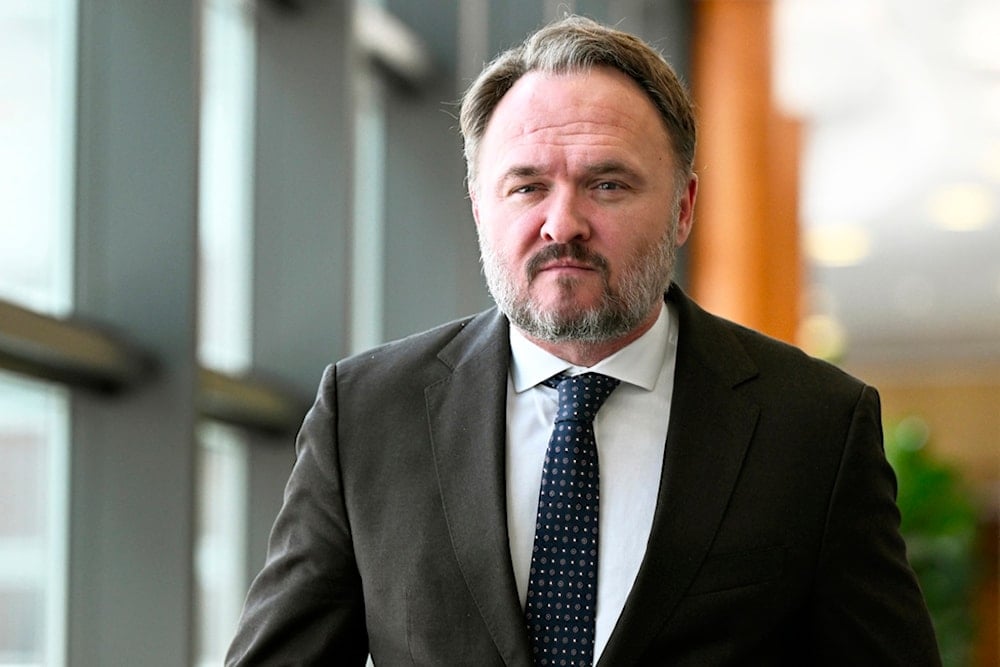EU energy chief pledges permanent break from Russian fuel
The European Union’s new energy chief has acknowledged that momentum for severing ties with Russia’s primary revenue source has slowed.
-

Designated European Commissioner Dan Jorgensen, Commissioner for Energy and Housing, during a first meeting with European Commission President Ursula Von der Leyen in Brussels, Belgium, Sept. 18, 2024 (AP)
EU's new energy chief Dan Jorgensen has made it his "main priority" to develop a plan that will completely sever the European Union's energy ties with Russia, Politico reported.
In his first interview since becoming the EU's energy chief, Jorgensen expressed concern that the EU's efforts to reduce reliance on Russian fuel are faltering and need a new strategy to regain momentum. He highlighted the bloc's increasing imports of Russian liquefied natural gas as a significant setback, along with the fact that five EU countries still depend on Russia for nuclear fuel.
Dan Jorgensen acknowledged the EU's significant progress in reducing its reliance on Russian energy, calling it “quite an accomplishment.” However, he stressed that “something new needs to happen because … now it's beginning to go in the wrong direction.” To address this, Jorgensen plans to introduce “a tangible roadmap” that will include “efficient tools and means for us to solve the remaining part of the problem.”
His strategy will primarily focus on gas but also address oil and nuclear energy. Jorgensen aims to present this plan within the first 100 days of his tenure, setting a mid-March deadline.
The big picture
The plan marks the next phase of the EU's efforts to overhaul its energy system following the beginning of the war in Ukraine, as per the report. The bloc has already implemented a full ban on Russia’s seaborne coal and oil exports while reducing its reliance on pipeline gas by about two-thirds. However, recent trends show the EU is on track to import approximately 10% more LNG from Russia in 2024 than in the previous year, according to the commodities platform Kpler. Addressing these remaining dependencies will be challenging.
Any effort to completely remove Russian energy from the EU by 2027—an unofficial deadline set after the full-scale war—will likely face significant opposition from countries that remain heavily reliant on Russian imports, the report added.
Jorgensen referred to his tenure as Denmark’s climate minister in 2022 when he attended eight emergency summits of EU energy ministers during a major gas price crisis. He said those negotiations provided him with "some experience in collaborating with colleagues … taking into account [that] there are different circumstances."
He will also have strong political backing for his efforts. Just this week, 10 EU capitals jointly advocated for sanctions on Moscow’s nuclear and LNG sectors.
Jorgensen’s plan is expected to be introduced shortly after the expiration of a long-term gas transit agreement, which has allowed Central European countries to continue importing Russian pipeline gas through Ukraine. While some countries are exploring alternatives to maintain the gas flow, Jorgensen anticipates the deal will expire.
"We are preparing for the situation that it will finish and … it’s one more reason why it’s important for us to have this roadmap very soon," he said, aligning with the EU executive’s longstanding stance on the 2019 Moscow-Kiev agreement.
EU’s energy future tied to US LNG imports amid shifting relations
The EU’s energy strategy, as per the piece, will also be influenced by its relationship with a Donald Trump-led United States, especially since Europe has turned to the US for LNG supplies as it reduced its reliance on Russia. The US is now the EU’s second-largest gas supplier.
LNG imports will be "certainly one of the first things we have to discuss" with the incoming US administration, Jorgensen said.
European Commission President Ursula von der Leyen has suggested that the EU may purchase more American fuel to avoid a potential trade conflict with the outspoken Republican leader, who has pledged to lift the moratorium on new US LNG export permits.
"We need to be mindful that we could not have done the decrease in dependency from Russia without energy from … the US," Jorgensen stated. "They really have been our friends and I hope, of course, that we will continue to be friends."

 4 Min Read
4 Min Read









